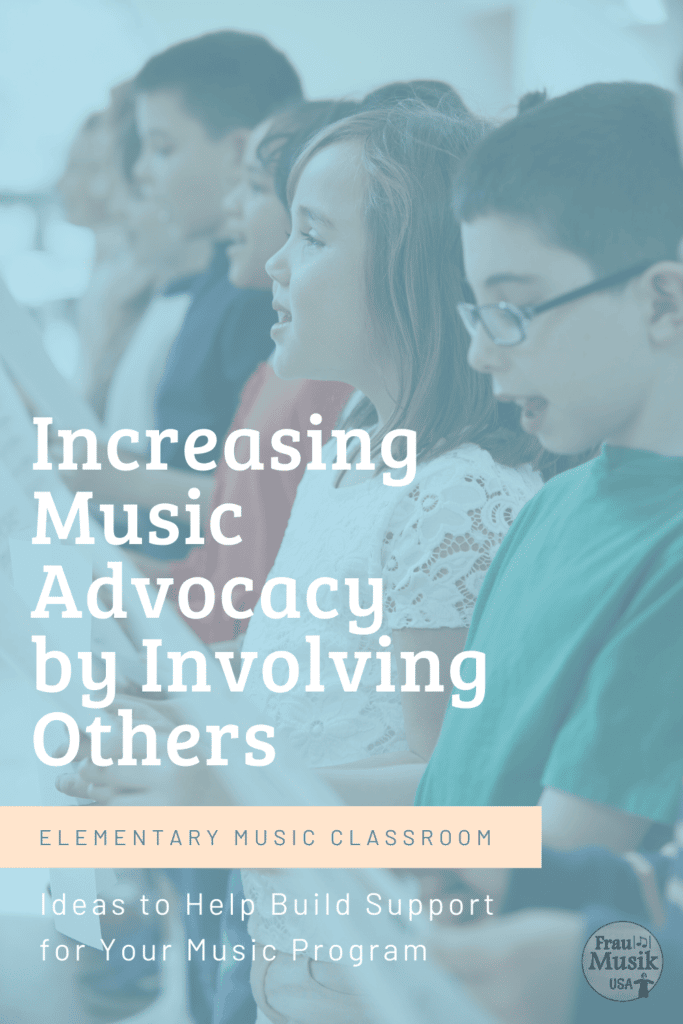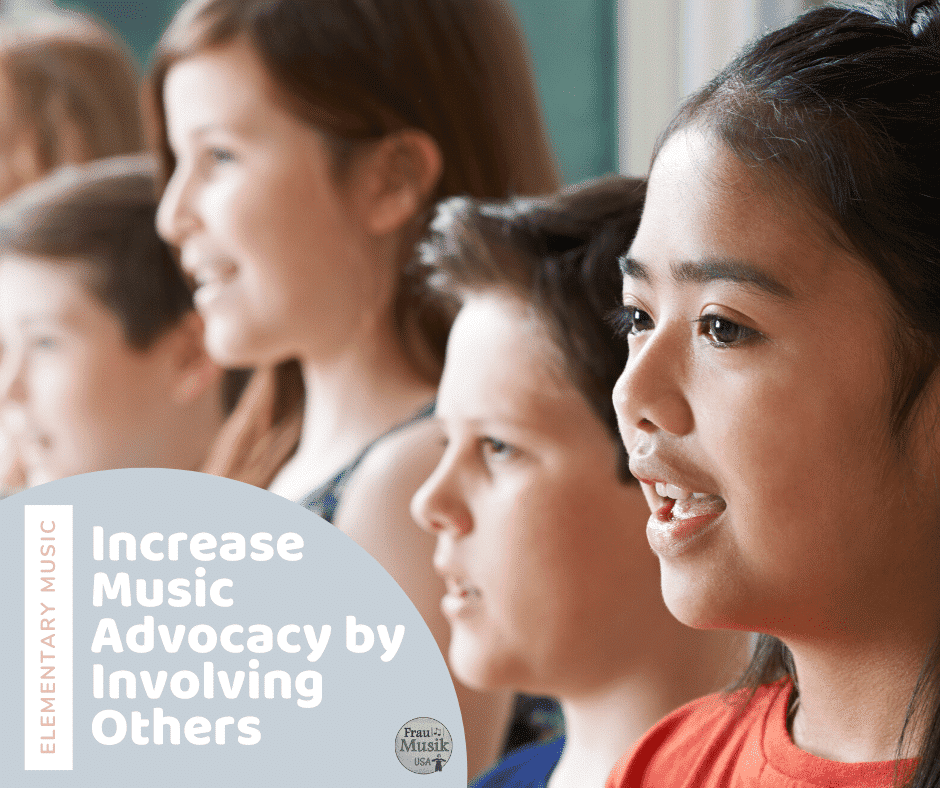8 Ways to Increase Music Advocacy by Involving Others
Discover innovative ways to increase music advocacy and engage others in your music program. Learn effective strategies to build support quickly.
Some of the links on our site are affiliate links. If you click on a link and make a purchase, we may earn a small commission.
Engaging others is one of the quickest ways to boost music advocacy and support for your program. Collaboration brings new perspectives and a wider network. Get creative and think “outside the box” to involve others in your elementary music program.
If you missed it, take a peek at the other posts in our 3-part music advocacy series.

What’s in this post? Click to open the Table of Contents
1. Use Volunteers to “Fill in the Gaps”
My first teaching position was as a band director in grades 5-12 for a small rural school district. Instrumentally, the high school band was very unbalanced, but the school staff and VERY small community were a treasure trove of musicians waiting to be tapped.
One father had played trumpet in a military band and our superintendent and principal were also trumpeters. I found several more parents and teachers who were also instrumentalists and willing to share their talents. I scheduled one evening rehearsal per week so that parents and teachers were able to attend.
Admittedly many of the adults had not played in years. One parent even asked me to give her a few lessons. But, they all got up to speed rather quickly. And having a larger more balanced group greatly enriched the performance experiences of my students and created instant parental support.
But, that was at the high school level. Read on for some fun ways you can begin to increase music advocacy for your elementary music classroom.
2. Augment Performances
For many years, I had an all-school choir of approximately 75 fourth and fifth graders. This was NOT an auditioned group. It was simply students who wanted to sing and perform more. The choir met before school to rehearse.
Each year, we performed a holiday program where I invited teachers and members of our school administration to perform with us on the last several pieces of the program.

We performed two separate concerts, one at school during the day and another in the community in the evening. It was AMAZING! Both students and staff looked forward to it. The superintendent of our large district even took the time to come join in. You never know unless you ask.
3. Enhance a School Event
I also created a small teacher orchestra that performed each year at our fifth-grade promotion ceremony. Most of these teachers only got their instruments out once a year. (One teacher even stored her instrument at school.)
The music provided by these teachers helped to make the event even more special for our fifth-grade students and all of the parents attending the ceremony. The teachers enjoyed performing and it was a fun way to bring back our retirees who continued to play for several years after retirement. 😊
4. Cameo “Celebrity” Performances
One year, the weatherman from our local TV station did a cameo appearance in our fourth-grade show, “The Weather Man.” He was a real sport. He actually climbed into the refrigerator box that served as the “television” for our set. In the last scene, the audience gasped when the “TV” came on and a “real celebrity” was inside. The “weatherman” even gave us a shout-out on the nightly news that evening using some of his lines from our show!
At the elementary level, many different people can qualify as “celebrities.” Other celebrity performers that you might consider inviting could include policemen, high school or middle school music teachers, high school musicians, local musicians, music teachers from nearby districts, coaches, etc.
5. Teachers Can Serve as “Celebrity” Performers
One year, all of our fifth-grade teachers performed cameo roles in “The Dream Catcher.” They played the role of the “monsters” in the kids’ dreams. The art teacher also had a cameo role. She even sang a solo! Performing alongside their students was a rewarding experience for the students and teachers.
Another year, our school librarian played double bass and our orchestra teacher played violin during a grade-level music program. They dressed in costume and played the roles of “ma” and “pa” in one of our shows. We sang, danced, and played Orff instruments while “ma” and “pa” fiddled. It was so much fun!
6. Invite Guests to Help Teach a Lesson or Unit
During our recorder unit, I taught my fifth graders to play a simple 12-bar blues vamp. Then we invited a local jazz musician to come and play a classroom performance with us. This allowed me to play the piano and keep our group on track while he improvised over the top of our soft recorder vamps.
With his guidance, we opened up the tune and several students volunteered to solo as well. I worked hard to prepare my students for this experience ahead of time, but the lesson was MUCH more successful than I could have done on my own.
7. Invite Retired Teachers to Help
Retired teachers make GREAT guest helpers. Two retired music teachers helped out in my classroom several times to assist in running music centers. This saved me TONS of time and we were able to introduce new more novel activities that really challenged students.
8. Teach a Collaborative Unit
When the second-grade teachers approached me about teaching a collaborative unit on the science of sound, I was excited about the prospect. Together we developed a new unit where some elements were taught in the music classroom and some were taught in the homeroom class.
As a part of that unit, students made homemade instruments. In the music room, we used those instruments for improvisation and presented a classroom performance. It was a WIN-WIN for all!
Start Slow and Plan for Success
Begin by implementing one new activity that involves others in your music program. If it is successful, it might turn into a tradition.
When you are involving others in music class performances, lessons, and other activities, those activities must be well-planned and structured for success. If not the project can easily derail and ultimately diminish support for your program.
Before you invite others into your classroom make sure you have outlined and communicated the details of the event. Make sure everyone is on the same page. And be sure your students are musically prepared and they know the behavior expectations for the activities.
Conclusion
Think “outside the box” for more positive ways you can involve others in your elementary music program. There are many possibilities all around you. When you involve others in well-planned and organized events, you build your community and build advocacy. Best of all, your students benefit from these experiences.
P.S. Elementary music teachers are important advocates to help build middle and high music programs. Enrollment in these music programs greatly increases the likelihood that your students will become lifelong music participants enriching their lives and the lives of those around them.
See 7 Ways Elementary Music Teachers Can Help Build High School Music Programs for specific strategies for advocating for the upper-level music programs in your district.
Meet the Author
Terri Lloyd is a former elementary music teacher with over 25 years of experience. She holds a Bachelor of Music, a Master of Science in Education, and a Technology Certificate in Instructional Design.
She is currently active in music education through blogging, workshops, and curriculum development. She serves on the music staff at her church and volunteers for an after-school children’s program. Terri is an active musician in the community, performing in a local Big Band, pit orchestras, and various events.
4 Comments
Comments are closed.